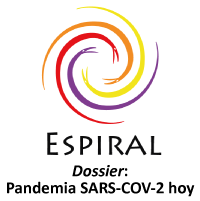The advance of COVID-19 in Santiago de Chile and its relationship with urban socio-environmental vulnerabilities
DOI:
https://doi.org/10.15381/espiral.v2i4.19534Keywords:
Coronavirus, surface temperatures, incidence ratesAbstract
The COVID-19 pandemic forced national governments to take social isolation actions, with the aim of stemming the progress of the virus and its brutal effects on the health and well-being of the population. This work aims to analyze the spatial behavior of this development in Santiago de Chile, the capital of the country located in the so-called Metropolitan Region, which has more than seven million inhabitants distributed in 38 communes or municipalities. By means of Landsat-7 satellite thermal images it is possible to characterize the most vegetated areas of the city, which are spatially correlated with those with lower thermal variation and the location of upper socioeconomic groups. The surface temperature values and pandemic incidence rates were crossed in each commune for the months of April, May and July 2020. The results showed that the rates of contagion arose in the richest communes of the city, located in the eastern side, such as Vitacura, Las Condes, Lo Barnechea and Providencia, in the month of April, in the beginning of the autumn. In the following month, it spreads evenly throughout the city, and in July, under the heart of the winter season, preferably locate itself in the poorest communes that reach the highest incidence rates, such as La Granja, La Pintana, San Ramón, Renca and San Joaquín, with at least 4500 contagions every 100 thousand people, which corresponds to 4.5% of its current populations. Many uncertainties persist about the spatial behavior of COVID-19 and its causes such as the natural environment, represented by the urban climate, and the socio-economic determinants of a city clearly characterized by deep socio-economic and socio-environmental inequalities.

Downloads
Published
Issue
Section
License
Copyright (c) 2021 Hugo Romero, Flávio Henrique Mendes

This work is licensed under a Creative Commons Attribution-NonCommercial-ShareAlike 4.0 International License.
LOS AUTORES RETIENEN SUS DERECHOS:
a. Los autores retienen sus derechos de marca y patente, y también sobre cualquier proceso o procedimiento descrito en el artículo.
b. Los autores retienen el derecho de compartir, copiar, distribuir, ejecutar y comunicar públicamente el artículo publicado en la revista Espiral (por ejemplo, colocarlo en un repositorio institucional o publicarlo en un libro), con un reconocimiento de su publicación inicial en la revista Espiral.
c. Los autores retienen el derecho a hacer una posterior publicación de su trabajo, de utilizar el artículo o cualquier parte de aquel (por ejemplo: una compilación de sus trabajos, notas para conferencias, tesis, o para un libro), siempre que indiquen la fuente de publicación (autores del trabajo, revista, volumen, número y fecha).





